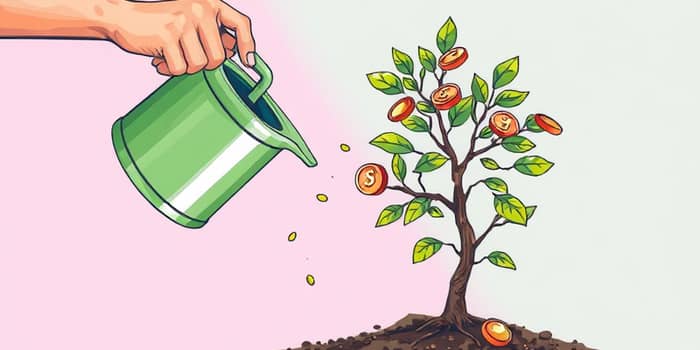Amid economic uncertainty, from rising living costs to unpredictable job markets, many feel overwhelmed by their finances. Yet, small but consistent actions—the bedrock of long-term wealth—can turn anxiety into confidence. By focusing on everyday habits rather than chasing quick wins, anyone can cultivate long-term financial stability and peace. This article explores the psychology behind money habits, highlights current barriers in 2025, and presents practical steps to empower readers toward a secure financial future.
The Science and Power of Money Habits
The secret to building real wealth lies not in sporadic windfalls but in the cumulative effect of modest, regular behaviors. The concept of compound interest is often described as the eighth wonder of the world—when you consistently set aside small sums, your money begins to grow exponentially. A savings plan that channels just $200 per month at a 7% annual return evolves into over $24,000 in a decade and may exceed $240,000 in forty years. This illustrates the power of compound interest in palpable terms.
Beyond numbers, cultivating stable money habits reduces stress and fosters a sense of control. Studies show that individuals who track spending and maintain emergency funds report 30% lower financial anxiety levels. Embracing these habits enhances both your economic well-being and overall quality of life, transforming money management from a source of dread into an act of self-care and growth.
Barriers Facing Americans (esp. Young Adults/Gen Z)
Despite the appeal of smart money moves, obstacles abound. In 2025, 64% of Americans identify money as their top stressor, and a staggering 37% cannot cover a $400 emergency without borrowing or selling possessions. Young adults face even greater hurdles: 51% of Gen Z cite the high cost of living as their biggest barrier, while 55% lack enough savings for three months of expenses. These challenges can feel insurmountable, but understanding them is the first step toward overcoming them.
- High living costs outpacing wage growth: Food, rent, and healthcare prices keep rising faster than earnings.
- Insufficient income for desired lifestyle: 53% of Americans say earnings fall short of needs and goals.
- Insufficient emergency savings for unforeseen events: 55% of Gen Z lack three months’ cushion.
- Lack of knowledge about homebuying costs: Only 30% of young adults understand fees beyond down payments.
Recognizing these barriers empowers you to address them directly—whether by renegotiating costs, seeking additional income streams, or adjusting your expectations in the short term.
Core Habits for Financial Success
Implementing the right habits transforms financial goals into achievable milestones. Begin by putting your savings on autopilot so you automate paying yourself first consistently. This approach ensures saving is prioritized, not delayed. Pair it with mindful budgeting to allocate resources effectively and curb impulse spending.
- Automate paying yourself first consistently by diverting 20% of income into savings or debt repayment.
- Follow the 50-30-20 budgeting method to allocate 50% to needs, 30% to wants, and 20% to savings or debt repayment.
- Consistently increase savings with each raise by channeling a portion of every income increase into investments.
- Maintain an emergency fund of three months of living expenses in a liquid account.
- Track every dollar you spend to identify leaks in your budget.
- Prioritize paying down high-interest debt and make extra payments whenever possible.
- Daily financial mindfulness practices to pause before purchases and align spending with your goals.
By weaving these habits into your routine, you create a resilient framework for wealth-building that adapts to life’s changes. Small strides compound into significant progress over time, nurturing both your bank balance and your peace of mind.
Tools, Resources, and Literacy
Access to the right resources can sharpen your financial edge. In 2025, 45% of Americans use digital budgeting apps or spreadsheets to manage cash flow, while 27 states now mandate personal finance education in high schools. Yet, U.S. adults still answer only 49% of basic financial questions correctly. Bridging this literacy gap is essential for everyone—from novices to seasoned savers.
Explore these tools and avenues:
- Budgeting apps with automated alerts and spending categorization.
- Credit union workshops, online webinars, and financial coaching services.
- Curated social media channels, with caution to vet the accuracy of advice.
- Community and institutional support through local nonprofits and employer-sponsored programs.
Here’s a snapshot of financial literacy across generations:
Improving your knowledge base empowers smarter decisions, reduces risk, and helps you spot opportunities in unfamiliar areas, from investing to homebuying.
Practical Examples and Anecdotes
Consider the journey of a 22-year-old named Alex, who began saving $100 each month right out of college. Within a decade, assuming a modest 6% return, those modest deposits grew to over $17,000—enough to fund a down payment or cushion a career transition. Alex’s story highlights how build momentum with incremental steps can lead to remarkable results, even when starting from a modest base.
Likewise, a community of Gen Z savers shared a collective approach: they prioritized basic needs—rent, groceries, and an emergency fund—over luxury spending. By steering clear of debt traps and focusing on stability, they improved their credit scores (Gen Z averages 680) and positioned themselves for future milestones like homeownership and entrepreneurship.
Conclusion: Taking Smart Steps Today
Financial success in 2025 doesn’t hinge on market timing or get-rich-quick schemes; it emerges from the steady application of proven habits. Each automated transfer, every budget review, and mindful purchase decision compounds into lasting financial freedom and confidence. Start with one habit—whether it’s tracking expenses or building a three-month cushion—and let that win fuel your next goal.
Embrace the journey, celebrate small victories, and remember that wealth is not a destination but a habit. With consistency and patience, you can transform uncertainty into opportunity and cultivate a future defined by confidence, security, and freedom.
References
- https://newsroom.bankofamerica.com/content/newsroom/press-releases/2025/07/confronted-with-higher-living-costs--72--of-young-adults-take-ac.html
- https://carry.com/learn/how-financially-literate-is-america-key-stats
- https://www.ent.com/education-center/smart-money-management/smart-savings-resolutions-top-5-smart-money-habits-for-the-new-year/
- https://www.moneyfit.org/gen-z-and-money/
- https://www.northbrookfinancial.com/blog/the-power-of-smart-money/
- https://www.pewresearch.org/short-reads/2025/05/07/growing-share-of-us-adults-say-their-personal-finances-will-be-worse-a-year-from-now/
- https://www.georgetown.edu/news/this-money-habit-can-revolutionize-your-finances/
- https://www.pewresearch.org/short-reads/2024/12/09/roughly-half-of-americans-are-knowledgeable-about-personal-finances/










